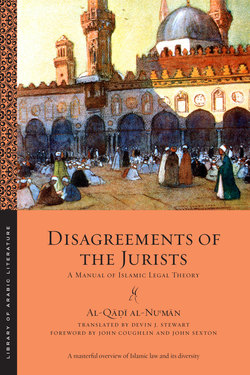Читать книгу Disagreements of the Jurists - al-Qadi al-Nu'man - Страница 17
На сайте Литреса книга снята с продажи.
ОглавлениеCHAPTER TWO
DISAGREEMENT OVER THE RULINGS OF THE RELIGION
15 Those Sunnis31 who are acclaimed as knowledgeable about the law agree unanimously that when legal rulings, the knowledge of permitted and forbidden matters, are apparent in the text of the Qurʾan, they must be ruled on and adopted in practice accordingly, and that those matters that they allege are not found in the Qurʾan should be sought from the Practices of the Messenger. If something is found in the Practices, then it should be adopted, and no other ruling besides should be sought. Many of them said, “We seek legal rulings that are found neither in the Book of God nor in the Practice of the Messenger of God among the opinions of the Companions. If we find that they professed an opinion and agreed unanimously upon it, we adopt that as the correct ruling. But if we find that they disagreed concerning it, we are free to choose the opinion of whichever Companion we wish and to adopt it.”
16 Some Sunni jurists32 said, “When we find that one of the Companions held a certain opinion, we do not deviate from his opinion. Regarding what we do not find in the Book of God, the Practices of the Messenger of God, or the opinions of any of the Companions, we examine the opinions of later scholars. If it is something on which the scholars are in agreement, then we adopt it, and we do not deviate from their unanimous agreement on this.” We will mention the opinion of each group of the Sunni jurists33 in this book when presenting their doctrine and refuting them.
17 Then they disagreed concerning what they allege is not found in the Book of God, or, they claim, in the Practice of their Prophet, or in the opinions of the Companions, or in the consensus of the scholars after them. One group of them espoused submission to the authority of their forebears and obedience to their masters and leaders. They said: “They knew better than we where the truth lies. What they have said, we accept as the correct ruling, following them in this and not contradicting them. We accept on their authority what they adopted, and we defer to them with regard to what they said.” But these jurists differed concerning whose authority to accept, each group of them espousing the opinion of a different figure from among those who preceded them, adopting his opinion, considering permitted what he had made lawful to them, and considering forbidden what he had forbidden them. They made his opinion an incontrovertible argument, in their view, and they turned away from the opinions of those who went against him whom others followed and accepted as authorities. Each group considered the others to be in error, and each group accused the groups who opposed them of unbelief.
18 Other jurists disagreed with them, and rejected arbitrary submission to authority. Concerning matters of which they were ignorant, they adopted the doctrine of those whom the others accepted as authorities with respect to the derivation of legal rulings. They said: “We can derive rulings just as they did, and we do not accept their opinions merely on authority.”34 Some of them espoused analogy. Others espoused personal judgment and individual legal interpretation, others espoused preference, others espoused speculative reasoning, and others espoused inference. These are all labels that they applied to their opinions in order to claim that their methods formed part of what they alleged was the true doctrine. All of these methods revert to one fundamental idea, and they are all encompassed by one invalid concept, which is the adoption of whim and surmise, when God warned against both and criticized those who followed them. For He said: «Who is more miscreant than he who follows his own desire, with no guidance from God?»;35 «They follow nothing but a guess, and a guess can never take the place of the truth»;36 «O David, We have made you a representative on the Earth, so judge among the people by the truth, and do not follow your whim, lest it lead you astray from the path of God»;37 and «Judge among them by what God has sent down, and do not follow their whims.»38 In addition, the Messenger of God said: “Follow and do not innovate, for every innovation is an error, and every error leads to the Fire.” Those jurists followed their whims, without guidance from God, and they produced new rulings originating with themselves regarding the religion of God, contradicting the Book of God and the speech of the Messenger of God. I will present a full discussion of their error and of the argument against them, God willing, in the chapter which follows this one.
